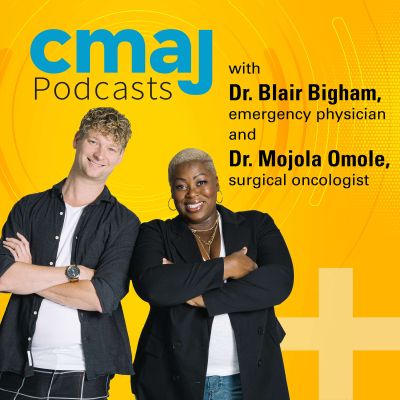CMAJ Podcasts: Exploring the latest in Canadian medicine from coast to coast to coast with your hosts, Drs. Mojola Omole and Blair Bigham. CMAJ Podcasts delves into the scientific and social health advances on the cutting edge of Canadian health care. Episodes include real stories of patients, clinicians, and others who are impacted by our health care system.
http://www.cmaj.ca
Gesamtlänge aller Episoden: 6 days 1 hour 16 minutes
Ensuring equitable access to cancer care for Black populations
Black and immigrant populations are disproportionately underrepresented in regular screening for cancer. Race-based data from Canada are minimally-available, but research from the United States and Europe has shown that the lifetime risk of developing prostate cancer is much higher among Black people compared to white people and Black people who do get the disease tend to have more aggressive tumors and to present at a later stage...
Optimizing care for patients experiencing sickle cell crises.
Several hospitals are known for providing particularly excellent care to people experiencing a sickle cell crisis. For example, the ER at UHN meets a key recommendation from the 2017 Ontario Clinical Handbook that patients receive analgesia within 30 minutes of triage. The handbook also recommends that centres support patients’ individual coping strategies through ready access to food, phone chargers and blankets.
Many ERs are not meeting this standard...
How to be better at diagnosing rare conditions.
Hereditary angioedema (HAE) is a rare autosomal dominant disorder characterized by recurrent episodes of painful swelling without urticaria that leads to substantial morbidity and even mortality if left untreated.
On this episode, Dr...
Urgent need to improve organ donation experience for donor families
Many families of organ donors describe feeling alone and abandoned at the moment when their loved one is taken to the operating room for donation. Heather Talbot says she and her family were left on their own as her son was wheeled into the OR. The experience left her thinking, “Well, they got what they wanted and they’ve moved on.”
A qualitative study in CMAJ examined the experiences of donor families...
Clearing Misconceptions about Functional Neurological Disorders
Functional Neurological Disorders (FND) make up a significant portion of referrals to neurology, maybe as high as 30%. However, misconceptions regarding these disorders remain across medicine, and patients are frequently dismissed as “faking it.”
FND are neuropsychiatric conditions in which patients experience neurologic symptoms due to a “functional” disruption of brain networks rather than a “structural” disorder of the nervous system...
Hot Flash: Experiencing menopause in medicine
When contemplating issues of diversity and inclusion, medicine needs to consider menopause. A commentary in CMAJ argues that discussion about and, where needed, accommodation of menopause is a necessary step toward providing women physicians with a supportive and comfortable work environment.
On this episode, Drs. Bigham and Omole speak with the lead author of the commentary “Hot Flash: Experiencing menopause in medicine.” Dr...
Encore Presentation: Recognizing and Treating POTS
This is an encore presentation of our most popular episode of the past year.
Postural orthostatic tachycardia syndrome (POTS) is a disorder that can profoundly affect patients' quality of life. Its main characteristic is tachycardia on standing without a drop in blood pressure. Patients complain of lightheadedness and palpitations when upright, which sometimes leads to syncope. This can cause substantial functional disability, which may be economically devastating...
Special Episode - Depression in pregnancy and the postpartum period: should we screen everyone?
The short answer to this question, according to a new guideline published in CMAJ, is “No.”
In this special episode, CMAJ editor in chief, Dr. Kirsten Patrick, talks to Dr. Eddy Lang, lead author of the guideline entitled Recommendation on instrument-based screening for depression during pregnancy and the postpartum period produced by the Canadian Task Force on Preventive Health Care...
Does bodychecking experience really reduce concussions?
In an effort to reduce the high burden of injury in Canadian youth ice hockey, most associations have restricted bodychecking nationally among leagues for younger players (age 11–12 yr), as well as in certain nonelite divisions of play in older age categories (age 13–17 yr.) This has been shown to be associated with reduced rates of injury, including concussion...
Fixing the problem of drug shortages in Canada
Drug shortages are a persistent problem in Canada and around the world. They interfere with patients’ ability to consistently take medication to manage chronic diseases. And they disrupt urgent care as critical drugs like epinephrine and propofol face shortages.
The COVID-19 pandemic led to concerns that the pandemic would exacerbate existing issues with drug shortages in Canada...
